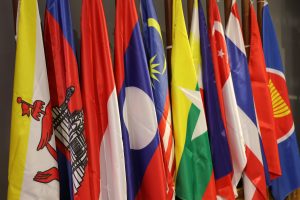The conventional wisdom within international governmental organizations is that the secretary general should ideally function more like a secretary than a general. The reason is the general unwillingness of member states to cede sovereign decision-making power to an international body.
The same logic can be applied to regional organizations. Two regional organizations are often seen as the paragons of success: the European Union and the Association of Southeast Asian Nations (ASEAN). However, there are significant differences between the two organizations and the intellectual networks and institutions that surround them.
The EU employs tens of thousands of administrative officers and diplomats who staff the European Commission, European Council, and European Parliament, while a host of consultative and advisory bodies provide inputs on the EU’s Common Foreign and Security Policy. Leaving aside the question of whether the EU can indeed have a common foreign and security policy, it is at least trying to do so under difficult circumstances, as Russia, its main energy supplier, withholds energy exports in response the sanctions of the EU and other Western countries over its invasion of Ukraine.
In contrast, the ASEAN Secretariat mainly serves as a depository for documents on ASEAN’s international relations. Many of these documents contain expressions of long-term aspirations, as the Southeast Asian bloc lacks a regional development fund with long-term implementation budgets.
While Southeast Asia, unlike Europe, is not currently experiencing a land war, the list of issues confronting ASEAN is growing longer and more challenging, from the Myanmar crisis, climate change, and COVID-19, to the rivalries over the South China Sea and the Mekong River and the rising costs of living. And while ASEAN’s participation in a number of key regional trade agreements, including the Regional Comprehensive Economic Partnership (RCEP), promises economic growth, integration, and connectivity to global supply chains, it is also likely to hasten economic, social, and cultural disruptions within Southeast Asian nations.
Yet despite these challenges, ASEAN’s existing institutional support is mostly inadequate. While an increasing array of entities are accredited to ASEAN, most of these organizations, institutions, and other stakeholders do not provide intellectual guidance to ASEAN.
One example of such an institution that does provide intellectual inputs in the region is the Council for Security Cooperation in Asia Pacific (CSCAP), a regional Track II organization established in 1993. The CSCAP is an informal mechanism comprising strategic studies centers from the ASEAN member states and the 17 non-ASEAN states in the ASEAN Regional Forum (ARF). The mechanism enables intellectuals, scholars, and policymakers to exchange information, insights, and experiences on regional political and security challenges relevant to the ARF. The CSCAP has relationships with institutions and organizations around the world.
Aside from the CSCAP, however, such supports are generally lacking within ASEAN. First of all, the bloc lacks neutral, regional think-tanks dedicated to examine complex regional issues, provide advice ASEAN on the best paths forward, and help coordinate ASEAN’s external relationships with its many partners and the full array of multilateral cooperation mechanisms.
Second, there is poor coordination between national think tanks, national ministries, and the ASEAN institutions. The Malaysian think tank, the Institute of Strategic and International Studies (ISIS), for instance, currently has no relationship to the think tank of the same name attached to the Malaysian Ministry of Foreign Affairs in Putrajaya, although it is part of the ASEAN-ISIS network and is accredited to ASEAN. The other ASEAN-ISIS think tanks around the ASEAN region mostly work on national security issues, and regional issues are not a priority.
Third, these think tanks do not focus on regional social or cultural concerns.
In a broader sense, ASEAN has not elaborated on how scholars or stakeholders may be involved in the ASEAN-led, mechanisms mentioned in the ASEAN Outlook on the Indo-Pacific (AOIP), through which ASEAN is hoping to engage with the stakeholders in the Asia-Pacific and Indian Ocean regions. Most of the ASEAN-led external arrangements, such as the ASEAN Plus One and other ASEAN-led multilateral frameworks like the ASEAN Plus Three, East Asian Summit, and ADMM Plus, lack formal mechanisms through which stakeholders can exchange ideas and information.
Finally, on the economic front, the connections between the many ASEAN business councils, the business councils of ASEAN’s external partners, and the ASEAN institutions are non-existent, infrequent, or weak.
The late Dr. Surin Pitsuwan, the only secretary general of ASEAN who was a former minister, and one of Thailand’s longest serving foreign ministers, recognized that the bloc’s greatest challenge was to create a regional organization of global stature, with commensurate resources and capacity. He called for ASEAN to engage with its stakeholders, particularly those working on social and cultural concerns, to build an ASEAN Community. But the momentum he created has stalled, even as the number of meetings convened by the organization has grown to around 1,500 each year.
ASEAN’s actions should be commensurate with the scale and complexity of the issues facing it, and built on interactions with a range of stakeholders, such as think tanks, business councils, businesses, civil society, and other interest groups. This is particularly important as the U.S. and China begin to decouple from one another, and as dramatic political, security, and economic shifts threaten to disrupt ASEAN’s goals. Meaningful discussion and reforms are necessary to ensure that economic progress in ASEAN is balanced, especially given the diverse political, social, and cultural circumstances of its 10 member states.
Without strong intellectual and institutional support, it is difficult to imagine how ASEAN will realize the ASEAN Community by 2025, nor to maintain its prized position of “centrality” amid rival diplomatic frameworks and the intensifying tug of war between the great powers.

































